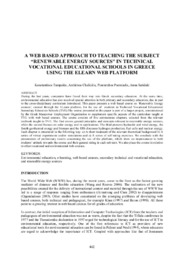| dc.contributor.author | Tampakis, Constantine (Konstantinos) | en |
| dc.contributor.author | Chalkidis, Anthimos | en |
| dc.contributor.author | Psomiadis, Ploutarchos | en |
| dc.contributor.author | Saridaki, Anna | en |
| dc.coverage.spatial | CY - Λευκωσία | en |
| dc.creator | Tampakis, Constantine (Konstantinos) | en |
| dc.creator | Chalkidis, Anthimos | en |
| dc.creator | Psomiadis, Ploutarchos | en |
| dc.creator | Saridaki, Anna | en |
| dc.date.accessioned | 2016-02-03T06:58:15Z | |
| dc.date.available | 2016-02-03T06:58:15Z | |
| dc.date.issued | 2007 | |
| dc.identifier.uri | http://hdl.handle.net/10797/14574 | en |
| dc.description | Περιέχει το πλήρες κείμενο | el |
| dc.description.abstract | During the last years, computers have found their way into Greek secondary education. At the same time,
environmental education has also received special attention in both primary and secondary education, due in part
to the cross-disciplinary curriculum introduced. This paper presents a web based course on ‘Renewable Energy
sources’, created through the ELearn platform, for the use of students in Technical Vocational Educational
Secondary Education Schools (TVE).The course presented in this paper is part of a larger project, commissioned
by the Greek Manpower Employment Organization to supplement specific aspects of the curriculum taught at
TVE with web based courses. The course consists of five autonomous chapters, selected from the relevant
textbook taught in TVE. The first covers general principles and concepts relevant to renewable energy sources,
while the second focuses on solar energy and its applications. The third presents hydraulic and wind energy, the
fourth geothermal energy and biomass and the fifth discusses hydrogen production, fuel cells and nuclear energy.
Each chapter is structured in the following way: a) A short treatment of the relevant theoretical background b) A
series of virtual experiments and/or simulations and c) A series of self-rating exercises. We conclude with the
presentation of preliminary results concerning the use of the platform, which show an improvement in both
students’ attitude towards the course and their general rating in each sub-unit. We also place the course in relation
to other vocational and environmental web courses. | en |
| dc.language.iso | eng | en |
| dc.publisher | University of Cyprus | en |
| dc.relation.ispartof | Physics, Chemistry and Biology education | en |
| dc.rights | info:eu-repo/semantics/openAccess | en |
| dc.rights | Open Access | en |
| dc.source | CBLIS Conference Proceedings 2007 Contemporary Perspective on new technologies in science and education | en |
| dc.title | A web based approach to teaching the subject “renewable energy sources” in technical Vocational educational schools in greece Using the elearn web platform | en |
| dc.type | info:eu-repo/semantics/conferenceObject | en |
| dc.subject.uncontrolledterm | Environmental education | en |
| dc.subject.uncontrolledterm | e-learning | en |
| dc.subject.uncontrolledterm | Web based courses | en |
| dc.subject.uncontrolledterm | secondary technical and vocational education and renewable energy sources | en |
| dc.contributor.conferenceorganizer | Learning in Science Group, University of Cyprus | en |
| dc.contributor.coordinator | Constantinou, Constantinos P. | en |
